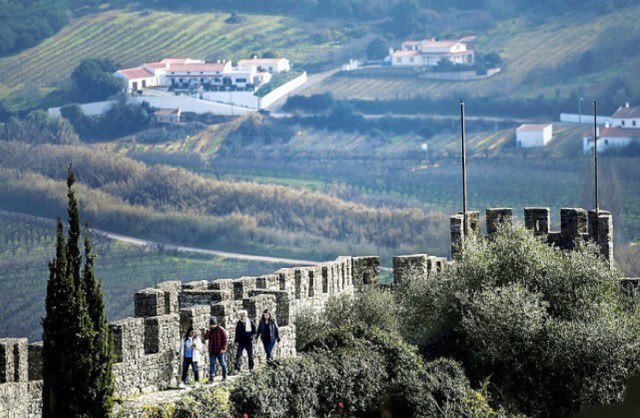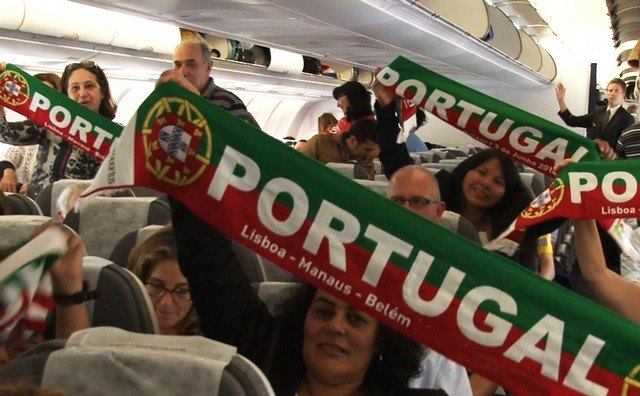We are in Portugal. Here in the heart of this star-shaped citadel, listed as a World Heritage Site by UNESCO, about ten kilometres from the Spanish border, there is a construction site where dozens of workers are working to renovate an imposing 17th century building.
The building, which was a convent and then a military court before falling into ruins, is due to regain its original appearance by next year and accommodate an 80-bedroom luxury hotel.
 [1] » « We are convinced that with a quality hotel, we will make sure that tourists stop at Elvas« , says, Jorge Rebelo de Almeida, president of the second Portuguese hotel group, Vila Galé, who won the tender to renovate and operate this site.
[1] » « We are convinced that with a quality hotel, we will make sure that tourists stop at Elvas« , says, Jorge Rebelo de Almeida, president of the second Portuguese hotel group, Vila Galé, who won the tender to renovate and operate this site.
In Portugal, tourism has become the main driver of the economy. The country relies on the concessioning of its historical heritage to private groups to diversify its offer and attract visitors all year round.
Elvas is one of the sites selected by the socialist government in the « Revive » programme, which plans to entrust the management of some 30 exceptional sites to private groups – mainly hotel groups – for a period of up to 50 years.
The convent of Santa Clara in the north, the barracks of Graça in Lisbon or the fort of Sao Roque in the south, a total of 33 sites have to be renovated, most of them converted into hotels.
A beautiful differentiated offer
 [2] « I am convinced that the future of tourism will depend on hotels offering a differentiated offer« , says Vila Galé’s boss, whose turnover grew by 13% in 2017 to 173 million euros.
[2] « I am convinced that the future of tourism will depend on hotels offering a differentiated offer« , says Vila Galé’s boss, whose turnover grew by 13% in 2017 to 173 million euros.
With the British in the lead, but also Germans, Spaniards, French and Americans, more and more tourists are choosing Portugal as a holiday destination, mainly from spring to autumn.
Above all, they will visit Lisbon and its monuments that bear witness to the epic of great discoveries, as well as the vineyards of the Porto region in the north, classified as a World Heritage Site, or take advantage of the beaches and cliffs carved by the erosion of the sea.
the Algarve to the south.
But « we want to get out of these traditional destinations » and « spread the tourist activity throughout the year« , says Ana Mendes Godinho, Secretary of State for Tourism.
Objective: capitalize on tourism. This sector, which accounts for 12.5% of GDP, has become the main creator of jobs in a country emerging from the economic crisis after a rescue package by the European Union.
 [3]With more than 20 million visitors in 2017,57.5 million overnight stays and a sharp increase in revenues to more than 14 billion euros, tourism has enabled the creation of some 53,000 new jobs last year in Portugal.
[3]With more than 20 million visitors in 2017,57.5 million overnight stays and a sharp increase in revenues to more than 14 billion euros, tourism has enabled the creation of some 53,000 new jobs last year in Portugal.
A record year for Portuguese tourismA record year for Portuguese tourism
The year 2016 had already set a record with 18.2 million tourists and 2017 was even better, both in terms of tourist numbers and receipts.
These excellent results show that « the tourism sector can still grow a lot in Portugal« , says the Portuguese Secretary of State.
Industry professionals seem confident for 2018.
« With the reservations we already have, we expect this year to be better than 2017, »said Raul Martins, president of the Portuguese Hotel Association (AHP), which brings together more than 60% of the country’s establishments.
Pestana, Portugal’s leading hotel group, also shares this optimism. « Portugal is experiencing a moment of euphoria », said José Roquette, the group’s development director, who exploits the Pousadas de Portugal (« Inns of Portugal »), a network of historical monuments converted into charming hotels.
Halfway between Lisbon and Porto, in the medieval town of Obidos, Pestana will be expanding this year its hotel nestled in the heart of the castle to double its hotel capacity, from 19 to 47 rooms, to cope with a sharp increase in demand.